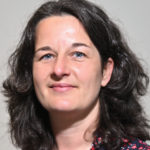The IDOS water team actively contributed to the United Nations World Water Day 2024. This year’s motto „Water for peace“ was at the centre of the column „Water for peace? Peace for water in Gaza!“.
The authors Dr Annabelle Houdret and Dr Ines Dombrowsky showed in a special edition of the Current Column how Israel is using water as a weapon in the Gaza war. In addition to that, Annabelle Houdret discussed in a lecture at the University of Birmingham on 19 March, why conflicts over water arise between states or even within countries, and how the resource could be used more effectively for cooperation.
The event „Water and global cohesion – How can we resolve conflicts of use?„, which Dr Irit Ittner moderated at the Bonn headquarters of the German UNESCO Commission on 20 March, dealt with water-related cooperation at a global level. Three panellists, Prof. Lars Ribbe (Chairman of the Scientific Advisory Board of UNESCO’s International Hydrological Programme), Harald Köthe (Director of the International Centre for Water Resources and Global Change) and Dr Johannes Cullmann (Head of Staff at the Federal Institute of Hydrology), emphasised the need for better coordination between water-using sectors, but also improved for cooperation between the UN institutions that implement water-related programmes.
As part of its current role as spokesperson for the BonnWaterNetwork, IDOS also organised an exchange between scientists, non-governmental organisations and political decision-makers at the UNCCD Secretariat on 22 March. In this debate „The land-water nexus: improving science-policy interfaces to strengthen resilience„, Dr Srinivasa Srigiri (IDOS) and others emphasised that improved communication and cooperation between science, civil society and decision-makers are essential in order to deal with the challenges of drought and flooding efficiently, but also in a socially and ecologically sustainable manner.
Annabelle Houdret will speak on 8 April at the University of Hohenheim’s colloquium on World Water Day on the topic of „Local water conflicts – improving governance to strengthen cooperation“.




